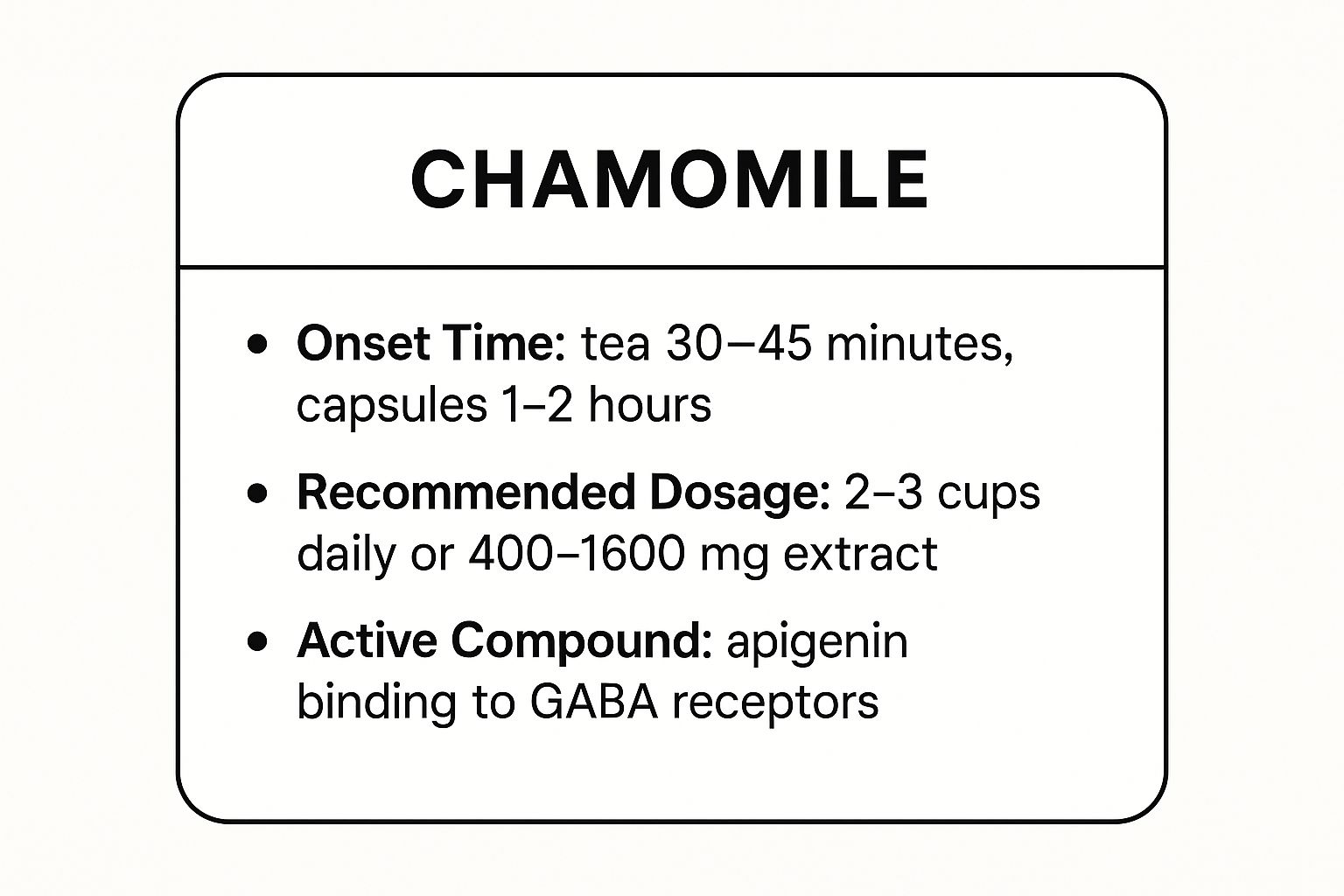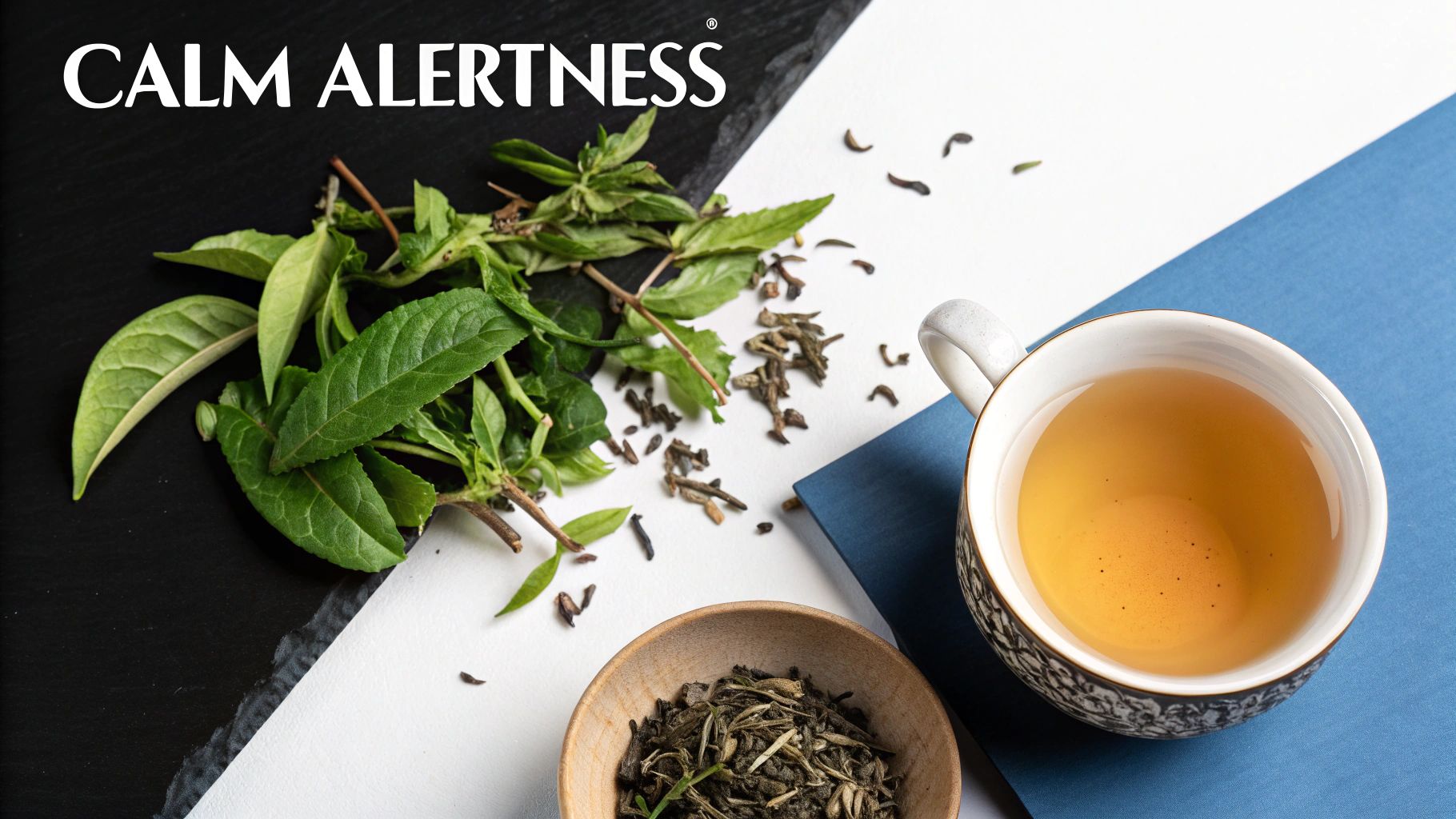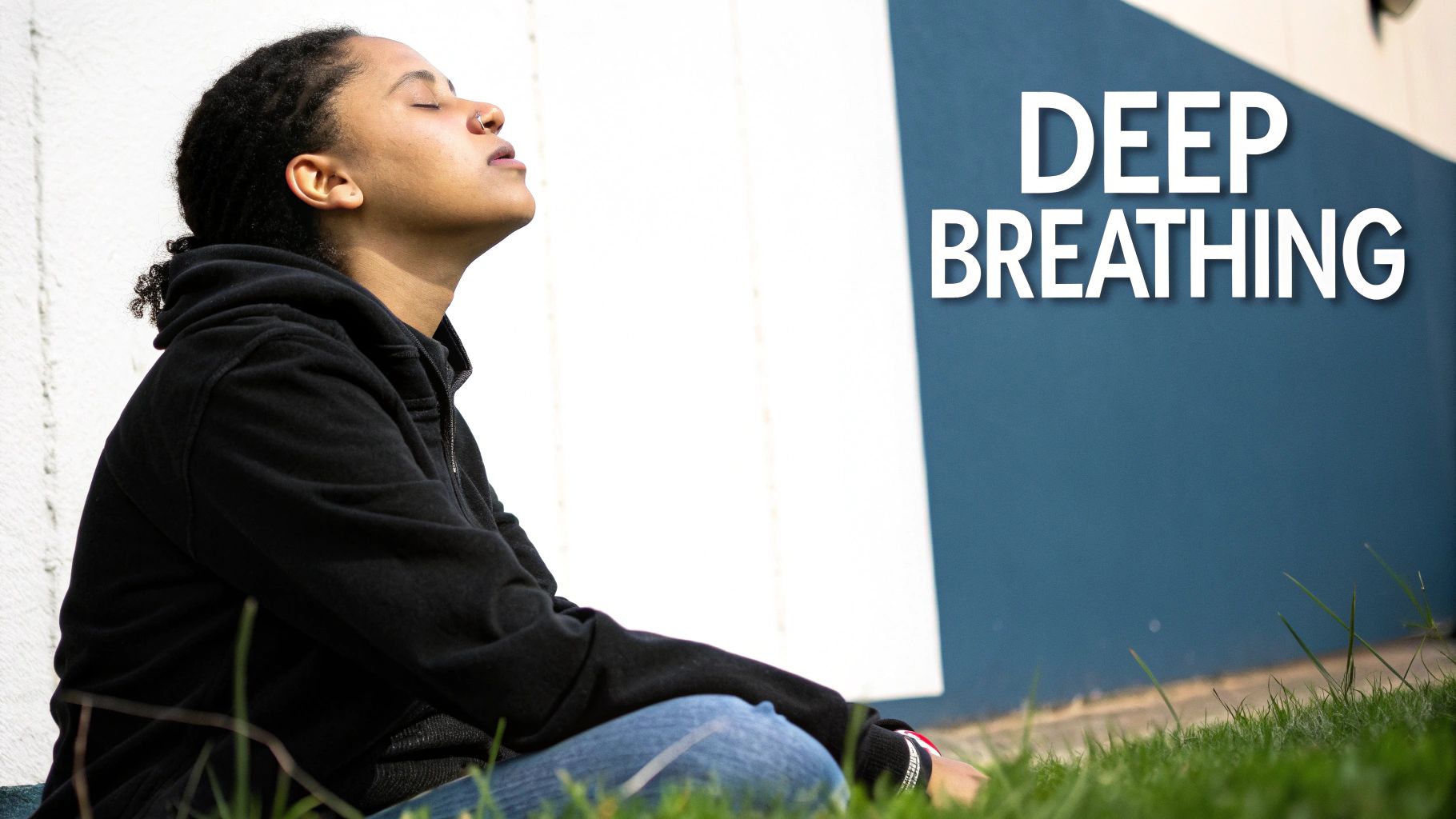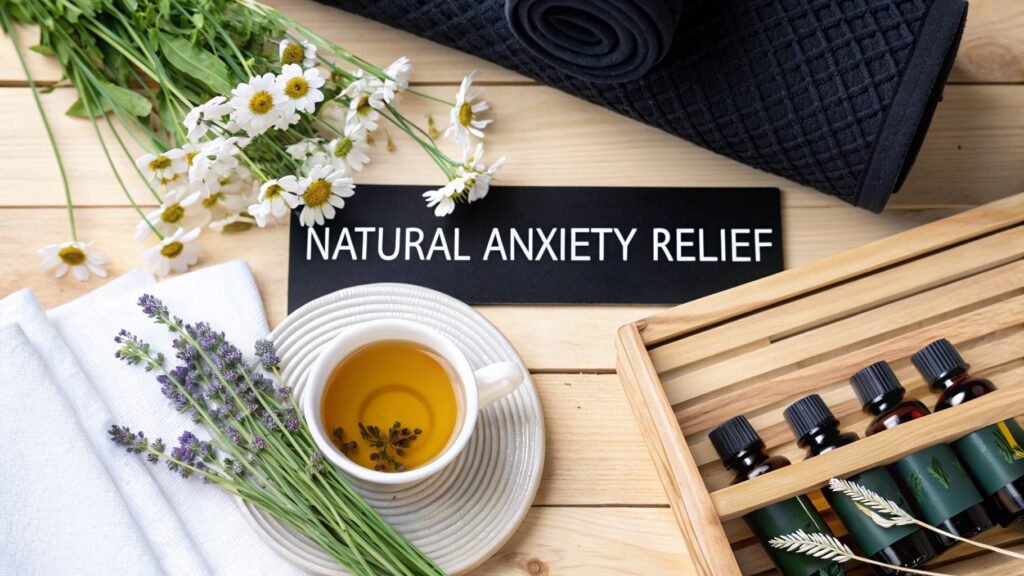Anxiety can feel like a constant, unwelcome companion, impacting everything from your sleep and daily focus to your overall sense of well-being. While professional medical advice remains a critical component of any treatment plan, a growing body of scientific evidence supports the use of specific natural remedies to help manage symptoms and restore a sense of calm. This guide is designed to move beyond generic advice, offering a comprehensive look at powerful, evidence-backed natural remedies for anxiety.
We will explore a curated list of botanicals, supplements, and mind-body techniques that have demonstrated tangible benefits. For each item, you will find a clear explanation of how it works, a summary of its scientific backing, and, most importantly, actionable strategies for integrating it into your daily routine.
This in-depth roundup provides the specific, practical details you need to make informed decisions about your health. Whether you're seeking to complement an existing treatment or explore holistic options for the first time, this article offers a clear, structured path toward finding effective and sustainable relief from anxiety's persistent grip.
1. Chamomile
Often recognized as a gentle, sleep-inducing tea, Chamomile (specifically German chamomile, Matricaria chamomilla) is one of the most ancient and well-researched natural remedies for anxiety. Its power lies in its unique biochemical composition, particularly a flavonoid compound called apigenin. This compound works by binding to specific benzodiazepine receptors in the brain, which are the same receptors targeted by some anti-anxiety medications. This interaction produces a mild, sedative-like effect that helps quiet a racing mind and ease physical tension associated with anxiety.
Efficacy in Clinical Settings
Chamomile’s reputation is supported by compelling scientific evidence. A significant 2016 study found that long-term use of pharmaceutical-grade chamomile extract (1,500mg daily) effectively reduced moderate-to-severe symptoms of Generalized Anxiety Disorder (GAD). Another study involving hospital patients demonstrated that those who drank chamomile tea experienced a 50% greater reduction in anxiety scores compared to a control group. Its gentle nature also makes it suitable for vulnerable populations, where it has been used to successfully reduce agitation in nursing home residents with dementia.
To help you understand its practical application, the following summary box visualizes key data points for using chamomile as a natural anxiety remedy.

This data highlights how quickly you can expect to feel the effects and provides a clear dosage range for both tea and supplement forms.
How to Use Chamomile Effectively
Integrating chamomile into your routine is straightforward and can be tailored to your needs.
- Start with Tea: Begin with one to two cups of high-quality chamomile tea daily, preferably in the evening to promote restful sleep. For maximum benefit, steep the tea for 10-15 minutes in a covered mug to prevent the beneficial volatile oils from escaping.
- Consider Standardized Extracts: For a more potent and consistent dose, look for capsules containing a standardized extract of at least 1.2% apigenin. This ensures you are receiving a therapeutic amount of the key active compound.
- Combine for Synergy: Adding a teaspoon of raw honey not only enhances the flavor but may also contribute its own mild calming properties, making your chamomile ritual even more effective.
2. Ashwagandha
Recognized as a cornerstone of Ayurvedic medicine for over 3,000 years, Ashwagandha (Withania somnifera) is a powerful adaptogenic herb. Adaptogens help the body become more resilient to physical and emotional stress. Ashwagandha's primary mechanism for easing anxiety involves modulating the body's stress response system, specifically by regulating cortisol levels. By helping to lower this primary stress hormone, it can reduce the physiological symptoms of anxiety and promote a state of calm.
Efficacy in Clinical Settings
Modern science has begun to validate ashwagandha’s long-standing use as a natural remedy for anxiety. A notable 2019 clinical study demonstrated that adults taking 300mg of a high-concentration ashwagandha root extract twice daily experienced a significant 56.5% reduction in anxiety scores compared to a placebo group. Beyond clinical trials, its benefits are seen in real-world applications; corporate wellness programs often incorporate ashwagandha to help employees manage workplace stress, and athletes report better stress management and focus during high-stakes competitions.
This data highlights how consistently taking ashwagandha can lead to substantial improvements in managing chronic stress. For those exploring comprehensive herbal solutions for mood regulation, learning more about herbal medicine on drerictsai.com can provide further context.
How to Use Ashwagandha Effectively
To integrate ashwagandha safely and effectively into your wellness routine, consider the following guidelines.
- Start with a Standard Dose: Begin with 300-500mg of a full-spectrum root extract, taken twice daily with meals to improve absorption and minimize potential stomach upset. Splitting the dose (e.g., morning and evening) helps maintain stable levels in your system.
- Look for Quality Extracts: For reliable potency and purity, choose supplements featuring branded, clinically tested extracts like KSM-66 or Sensoril. These forms have been standardized to ensure a consistent concentration of active withanolides.
- Be Patient and Consistent: Ashwagandha’s effects are cumulative. It is crucial to take it consistently for at least four to six weeks to fully assess its impact on your anxiety levels and overall sense of well-being.
3. L-Theanine
L-Theanine is a unique amino acid found almost exclusively in tea leaves, particularly in green tea (Camellia sinensis). Unlike sedatives, it promotes a state of calm alertness, making it an excellent natural remedy for anxiety during the daytime. Its mechanism involves increasing alpha brain waves, which are associated with a state of "wakeful relaxation," similar to that achieved during meditation. L-Theanine also influences key neurotransmitters, boosting levels of GABA, serotonin, and dopamine, which helps regulate mood, reduce stress, and improve focus without causing drowsiness.

Efficacy in Clinical Settings
Research validates L-Theanine's anxiolytic (anti-anxiety) effects. A 2019 randomized controlled trial demonstrated that healthy adults who took 200mg of L-theanine daily for four weeks reported significant reductions in stress-related symptoms and improvements in cognitive function compared to a placebo group. Another study showed that L-theanine could reduce the psychological and physiological stress responses in individuals facing acute, high-stress tasks. This ability to calm the mind while sharpening focus explains its historical use by Japanese Buddhist monks to enhance meditation and its modern adoption by students to mitigate test anxiety.
To help you understand its practical application, the following summary box visualizes key data points for using L-Theanine as a natural anxiety remedy.
This data highlights how quickly you can expect to feel the effects and provides a clear dosage range for both tea and supplement forms.
How to Use L-Theanine Effectively
Integrating L-Theanine into your wellness routine can be done strategically for maximum benefit.
- For Acute Stress: Take a 100-200mg capsule approximately 30-40 minutes before a known stressful event, such as a presentation or exam. For faster absorption, consume it on an empty stomach.
- Enhance Focus and Calm: A popular combination in biohacking circles is to pair 100-200mg of L-theanine with 50-100mg of caffeine (about one cup of coffee). This synergy, often called "smart caffeine," provides heightened focus and energy without the typical jitters or crash.
- Choose High-Quality Supplements: When selecting a supplement, look for purity and potency. Brands like Suntheanine are patented, highly purified forms of L-theanine that have been extensively studied and are known for their reliability and effectiveness.
4. Lavender
More than just a pleasant fragrance, Lavender (Lavandula angustifolia) is a powerful natural remedy for anxiety, with both its essential oil and oral preparations demonstrating significant clinical effects. Its calming action is largely attributed to a key active compound called linalool. Linalool interacts with the nervous system by inhibiting certain neurotransmitters, similar to how some anti-anxiety medications work, which helps to reduce feelings of agitation and promote a sense of calm without causing sedation.
Efficacy in Clinical Settings
Lavender's anxiolytic properties are well-documented in scientific literature. A landmark study on Silexan, a standardized oral lavender oil preparation, found it was as effective as the benzodiazepine lorazepam in treating Generalized Anxiety Disorder (GAD), but without the associated dependency risk. Furthermore, lavender aromatherapy is frequently used in clinical environments; for instance, hospitals often use it to reduce pre-surgery anxiety in patients. It has also been effectively integrated into evening care routines in nursing homes to soothe agitation and improve sleep quality among residents.
To help you understand how lavender can be integrated into a broader holistic plan, consider exploring how different healing modalities approach anxiety. Learn more about Traditional Chinese Medicine's perspective on anxiety and how botanicals like lavender fit into that framework.
How to Use Lavender Effectively
You can easily incorporate lavender's benefits into your daily routine through several methods.
- Practice Aromatherapy: Add two to three drops of high-quality, pure lavender essential oil to an ultrasonic diffuser and run it in your living space or bedroom to create a calming atmosphere. For on-the-go relief, a lavender sachet or roller bottle can be a discreet and effective tool.
- Consider Oral Supplements: For more consistent and potent anxiety relief, look for standardized oral lavender oil capsules (like Silexan). The clinically studied dosage is typically 80-160 mg daily.
- Create a Calming Ritual: Add five to ten drops of lavender oil to a warm evening bath. The combination of the warm water and the inhaled aroma helps to relax muscles and quiet the mind before sleep.
5. Passionflower
A striking climbing vine with intricate, vibrant flowers, Passionflower (Passiflora incarnata) is a highly regarded botanical used for centuries as a potent natural remedy for anxiety and sleep disturbances. Its calming action is primarily attributed to its ability to increase the levels of a neurotransmitter called gamma-aminobutyric acid (GABA) in the brain. GABA works by inhibiting brain signals that produce excitement or stress, resulting in a state of relaxation and reduced nervous tension without the significant sedative effects or dependency risks associated with some pharmaceuticals.
Efficacy in Clinical Settings
Passionflower’s effectiveness is not merely anecdotal; it is substantiated by robust clinical research. A landmark double-blind study from 2001 found that a passionflower extract was as effective as oxazepam, a common benzodiazepine medication, in treating Generalized Anxiety Disorder (GAD) over a four-week period, but with significantly fewer side effects. Its anxiolytic properties are so well-recognized that it is used in some European hospitals to reduce patient anxiety before surgical procedures. It is also a frequent key ingredient in many professionally formulated herbal blends for stress and sleep.
How to Use Passionflower Effectively
You can easily incorporate passionflower into your wellness routine to manage symptoms of anxiety.
- Begin with Tea or Extract: Start with one cup of passionflower tea or a 250mg extract supplement daily to gauge your response. For sleep-related anxiety, take your dose 30-60 minutes before bedtime.
- Utilize Tincture for Precision: For more immediate effects and precise dosing, consider a liquid tincture. This form allows for easy dose adjustments, which is ideal when managing fluctuating anxiety levels throughout the day.
- Create a Synergistic Blend: Passionflower works exceptionally well when combined with other calming herbs. Blending it with chamomile or valerian root can create a more comprehensive and powerful formula for managing both the mental and physical symptoms of anxiety.
6. Magnesium
Often referred to as the "relaxation mineral," magnesium is an essential nutrient vital for over 300 biochemical reactions in the body, including many that regulate the nervous system's response to stress. Its role as a natural remedy for anxiety stems from its ability to modulate the activity of the hypothalamic-pituitary-adrenal (HPA) axis, our central stress response system. Magnesium helps maintain healthy levels of GABA, a calming neurotransmitter, while also limiting the release of stress hormones like cortisol. A deficiency, which is surprisingly common, can disrupt this delicate balance and lead to an overactive nervous system, manifesting as heightened anxiety and muscle tension.
Efficacy in Clinical Settings
Magnesium's calming effects are well-documented in both clinical and emergency contexts. Research has consistently linked low magnesium levels to higher anxiety, and studies show that supplementation can produce significant improvements. For instance, a systematic review published in the journal Nutrients found that existing evidence supports a beneficial effect of magnesium supplementation for subjective anxiety. In more acute situations, emergency rooms have been known to administer intravenous magnesium to rapidly calm patients experiencing severe panic attacks. Furthermore, athletes often use magnesium to mitigate performance anxiety and aid in muscle relaxation, demonstrating its dual-action benefits on both mind and body.
How to Use Magnesium Effectively
Incorporating magnesium can be a highly effective strategy, but choosing the right form and dosage is key for optimal results.
- Choose High-Absorption Forms: Not all magnesium supplements are created equal. Opt for highly bioavailable forms like magnesium glycinate or magnesium citrate, which are absorbed more easily and are less likely to cause digestive upset than magnesium oxide.
- Start Low and Go Slow: Begin with a dose of around 200mg per day, preferably taken with a meal. You can gradually increase to a therapeutic range of 400-600mg daily, splitting the dose between morning and evening to maintain stable levels and minimize side effects.
- Consider Topical Application: For those with sensitive digestive systems, topical magnesium oil or Epsom salt (magnesium sulfate) baths offer an alternative absorption route through the skin, promoting muscle relaxation and a sense of calm.
7. Deep Breathing and Progressive Muscle Relaxation
Among the most immediate and accessible natural remedies for anxiety are mind-body techniques that directly engage the body’s relaxation response. Deep breathing and progressive muscle relaxation (PMR) are evidence-based practices that activate the parasympathetic nervous system, effectively counteracting the "fight-or-flight" state induced by anxiety. Deep diaphragmatic breathing slows the heart rate and lowers cortisol levels, while PMR, developed by Dr. Edmund Jacobson, systematically releases the physical tension that often accompanies psychological stress.

Efficacy in Clinical Settings
The effectiveness of these techniques is well-documented and forms a cornerstone of many therapeutic approaches, including Cognitive Behavioral Therapy (CBT). For instance, military personnel widely use "box breathing" to manage stress in high-pressure situations. A study published in the Journal of Affective Disorders found that a brief 15-minute PMR session significantly reduced state anxiety in participants. Similarly, controlled breathing practices like the 4-7-8 technique, popularized by Dr. Andrew Weil, have been shown to calm an overstimulated nervous system almost instantly, making them powerful tools for managing acute anxiety and panic.
To help you visualize how to apply this, the following video guide demonstrates a simple but effective breathing exercise.
This guided practice is a great starting point for integrating these calming techniques into your daily life. For more information, you can learn more about reducing anxiety naturally here.
How to Use These Techniques Effectively
Integrating these practices requires consistency to build the mind-body connection.
- Practice the 4-7-8 Breath: Inhale quietly through your nose for a count of four, hold your breath for a count of seven, and then exhale completely through your mouth for a count of eight. Repeat this cycle three to four times.
- Implement Progressive Muscle Relaxation: Set aside 10-15 minutes. Start with your feet, tensing the muscles for five seconds, then fully releasing the tension. Systematically work your way up your body, tensing and releasing each major muscle group.
- Use Guided Sessions: Apps like Headspace or Calm offer structured sessions for both deep breathing and PMR, which can be helpful when you are first starting out. Consistency is key, so aim for at least one session daily.
8. Omega-3 Fatty Acids (EPA/DHA)
Often associated with cardiovascular health, Omega-3 fatty acids are essential fats that play a crucial role in brain function and emotional regulation. Their power as one of the key natural remedies for anxiety stems from their anti-inflammatory properties and their direct impact on neurotransmitter systems. Specifically, eicosapentaenoic acid (EPA) and docosahexaenoic acid (DHA) help reduce neuroinflammation, a contributing factor to mood disorders. They also support the fluidity of brain cell membranes, enhancing communication between brain cells and supporting the function of serotonin and dopamine.
Efficacy in Clinical Settings
The connection between omega-3s and mental wellness is supported by robust scientific research. A meta-analysis of clinical trials found that supplements with a high ratio of EPA to DHA were significantly more effective at reducing anxiety symptoms, with some studies showing a reduction of over 20%. Researchers like Dr. Joseph Hibbeln from the National Institutes of Health have observed that populations with high fish consumption, such as those following a Mediterranean diet, consistently report lower rates of anxiety and depression. These findings have led to the use of high-dose omega-3s in clinical settings to augment treatment for anxiety disorders.
How to Use Omega-3s Effectively
Integrating these essential fats into your diet can provide a foundational layer of support for your mental health.
- Aim for a Therapeutic Dose: For anxiety relief, clinical evidence suggests a daily intake of 1,000 to 2,000 mg of combined EPA and DHA. Focus on supplements that have a higher ratio of EPA, as this specific fatty acid appears to have more direct anti-anxiety effects.
- Choose High-Purity Supplements: Look for products that have been third-party tested for purity and potency to ensure they are free from heavy metals like mercury. High-quality brands often provide certificates of analysis.
- Optimize Absorption and Storage: Take your omega-3 supplement with a meal that contains fat to improve absorption and minimize potential stomach upset. To prevent the oils from going rancid, store them in the refrigerator after opening.
Natural Remedies for Anxiety: 8-Item Comparison Summary
| Item | Implementation Complexity 🔄 | Resource Requirements ⚡ | Expected Outcomes 📊 | Ideal Use Cases 💡 | Key Advantages ⭐ |
|---|---|---|---|---|---|
| Chamomile | Low – easy to prepare (tea, capsules) | Low – widely available, affordable | Moderate anxiety reduction, improved sleep | Daily anxiety management, mild sedation | Well-researched, safe, mild dependency risk |
| Ashwagandha | Moderate – requires daily consistent use | Moderate – standardized extracts | Significant anxiety reduction over weeks | Chronic stress-related anxiety | Addresses root cause, adaptogenic benefits |
| L-Theanine | Low – fast-acting, simple dosing | Moderate – supplement form, costlier | Quick calm alertness without drowsiness | Daytime anxiety, focus enhancement | Fast onset, no sedation, synergizes with caffeine |
| Lavender | Low to moderate – aromatherapy or capsules | Low to moderate – essential oils or oral | Fast relief (aromatherapy), comparable to meds | Acute anxiety relief, sleep improvement | Rapid onset, versatile use, pleasant scent |
| Passionflower | Moderate – requires multiple days to act | Moderate – teas or extracts | Anxiety relief similar to benzodiazepines | Anxiety and insomnia, pre-surgery anxiety | No dependency, sedative without cognitive impairment |
| Magnesium | Moderate – daily supplementation needed | Low – inexpensive mineral supplements | Anxiety reduction especially if deficient | Nutritional deficiency-related anxiety | Multi-benefit mineral, safe, cost-effective |
| Deep Breathing & PMR | Moderate – requires learning and practice | None – free techniques | Immediate relief, builds long-term resilience | Acute anxiety management, self-regulation | No cost, no side effects, immediate effect |
| Omega-3 Fatty Acids (EPA/DHA) | Moderate – supplement intake, long-term | Moderate to high – quality fish oil | Noticeable anxiety reduction in weeks | Mood support, brain health, chronic anxiety | Broad health benefits, well-studied |
Crafting Your Personalized Path to Calm
Navigating the landscape of natural remedies for anxiety is not about finding a single magic bullet, but rather about building a personalized toolkit that supports your unique physiology and lifestyle. Throughout this guide, we've explored a powerful spectrum of options, from the calming herbal support of chamomile and ashwagandha to the neurological benefits of L-theanine and omega-3 fatty acids. Each remedy, whether it's the soothing aromatherapy of lavender, the gentle relief from passionflower, the foundational support of magnesium, or the immediate grounding power of deep breathing exercises, offers a distinct pathway toward tranquility.
The true strength of these approaches lies in their synergy and your willingness to experiment thoughtfully. What works wonders for one person may be less effective for another. Your journey might begin by incorporating chamomile tea into your evening routine or adding an omega-3 supplement to your daily regimen. The key is to introduce one new element at a time, pay close attention to how your body and mind respond, and adjust your strategy accordingly. This process of self-discovery is fundamental to creating a sustainable and effective wellness plan.
Key Takeaways for Building Resilience
As you move forward, keep these core principles in mind:
- Consistency is Crucial: Many natural remedies, particularly adaptogens like ashwagandha and nutritional supplements like magnesium, build their effects over time. Consistent daily use is often necessary to experience their full benefits.
- Mind-Body Connection: Techniques like deep breathing and progressive muscle relaxation are not just ancillary practices; they are foundational. They directly influence your nervous system, providing an immediate tool to de-escalate anxiety in the moment and build long-term resilience.
- Holistic Integration: True wellness extends beyond supplements and herbs. Consider how your diet, sleep quality, and physical activity levels contribute to your overall mental state. These lifestyle factors are powerful natural remedies for anxiety in their own right.
Actionable Next Steps on Your Journey
To translate this knowledge into meaningful change, start with small, manageable steps. Choose one or two remedies from this list that resonate most with you. For instance, you could commit to a five-minute deep breathing exercise every morning or ensure your dinners include omega-3-rich foods like salmon or walnuts. Journaling your experiences can provide invaluable insight into what works best for you.
Beyond traditional remedies and relaxation techniques, exploring creative outlets can significantly contribute to mental well-being; consider these proven art therapy activities for anxiety to engage your mind in a therapeutic and expressive way. Ultimately, mastering these concepts is about empowerment. It’s about recognizing that you have a wealth of tools at your disposal to actively manage your anxiety and cultivate a lasting sense of inner peace and control.
If you are seeking a personalized, integrative approach that combines the wisdom of Traditional Chinese Medicine with modern understanding, the expertise at Eric Tsai Acupuncture and Herbs can help you find balance. Dr. Tsai develops comprehensive treatment plans using acupuncture and custom herbal formulas to address the root causes of anxiety. Schedule a consultation to discover your personalized path to well-being at Eric Tsai Acupuncture and Herbs.

